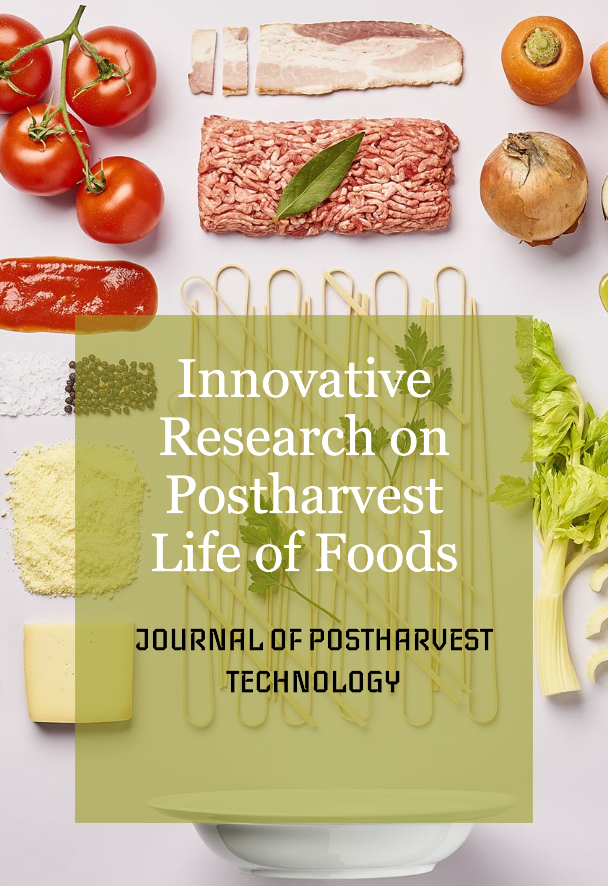Preparation and physico-chemical characterization of mushroom juice
Keywords:
Button mushroom, mushroom juice, stevia, rheologyAbstract
The development of a novel food product: ‘mushroom juice’ using naturally occurring ingredients has been discussed in this work. The paste of button mushrooms of equal maturity was boiled with beet root extract, pomegranate juice, stevia and cinnamon powder in a specific formulation for juice preparation. Physical, chemical and rheological properties of the final strained juice were estimated using standard procedures. The juice had a pH and total soluble solids (TSS) of 5.03±0.07 and 7±1˚Brix respectively with a bright red colour (L*=87.18±3.00; b*=180.69±1.59; b*>a*). Protein, fat, sodium and potassium for the prepared juice were estimated as 7.99±0.13%, 0.7±0.1%, 0.002% and 0.067% respectively. The juice was also found microbiologically safe due to absence of coliform, yeast and mould. Investigation of rheological studies showed that the juice exhibits non-newtonian behaviour. The product developed in this work is expected to find easy marketability through practical applications in food industries.
References
AOAC 2016. Official methods of analysis of AOAC International. Rockville, MD: AOAC International, ISBN: 978-0-935584-87- 5.
Bora, P., and Kawatra, A. 2014. Study on development of value added products from oyster mushroom (Pleurotus florida). Food Science Research Journal, 5(2): 165-167.
Jagadish, L.K., Krishnan, V.V., Shenbhagaraman, R., and Kaviyarasan, V. 2009. Comparative study on the antioxidant, anticancer and antimicrobial property of Agaricus bisporus (J.E. Lange) Imbach before and after boiling. African Journal of Biotechnology, 8: 654-661.
Kar, C.E., Ferchichi, A.,and Bouajila, J. 2011. Pomegranate (punica granatum) juices: chemical composition, micronutrient cations, and antioxidant capacity. Journal of Food Science, 76(6): 795-800.
Liu, J., Kan, L.J., and Jin, C.H. 2013. In vitro and in vivo antioxidant activity of ethanolic extract of white button mushroom (Agaricus bisporus). Food and Chemical Toxicology, 51(1): 310-316.
Mattila, P., Könkö, K., Eurola, M., Pihlava, J.M., Astola, J., Vahteristo, L., Hietaniemi, V., Kumpulainen, J., Valtonen, M, and Piironen, V. 2001. Contents of vitamins, mineral elements and some phenolic compounds in cultivated mushrooms. Journal of Agricultural and Food Chemistry, 49(5): 2343-2348.
Mau, J.L., Lin, H.C., and Chen, C.C. 2002. Antioxidant properties of several medicinal mushrooms. Journal of Agricultural and Food Chemistry, 50(21): 6072-6077.
Nemzer, B., Pietrzkowski, Z., Spóma, P., Thresher, W., Michalowski, T., and Wybraniec, S. 2011. Betalainic and nutritional profiles of pigment-enriched red beet root (Beta vilgaris L.) dried extracts. Food Chemistry, 127: 42-53.
Reis, F.S., Barros, L., Martins, A., and Ferreira, D. ICFR 2012. Chemical composition and nutritional value of the most widely appreciated cultivated mushrooms: An interspecies comparative study. Food and Chemical Toxicology, 50(2): 191- 197.
Sadler, M. 2003. Nutritional properties of edible fungi. Nutrition Bulletin 28(3): 305-308.
Sánchez, C. 2004. Modern aspects of mushroom culture technology. Applied Microbiology and Biotechnology, 64(6): 756-762.
Sharma, V.P., Annepu, S.K., Gautam, Y., Singh, M., and Kamal, S. 2017. Status of mushroom production in India. Mushroom Research, 26(2): 111-120.
Srivastava, R.P., and Kumar, S. 2016. Important methods for analysis of fruits/vegetables and their products. In: Fruit and Vegetable Preservation: Principles and Practice, 3rd edition. CBS publishers, New Delhi, pp 353-354.
Stamets, P. 2005. Notes on nutritional properties of culinary-medicinal mushrooms. International Journal of Medicinal Mushrooms, 7: 103-110.
Tarafdar, A., Shahi, N.C., Singh, A., and Sirohi, R. 2017. Optimization of freeze-drying process parameters for qualitative evaluation of button mushroom (agaricus bisporus) using response surface methodology. Journal of Food Quality, https://doi.org/10.1155/2017/5043612.
Wakchaure, G.C., Shirur, M., Manikandan, K., and Rana, L. 2010. Development and evaluation of oyster mushroom value added products. Mushroom Research, 19(1): 40-44.




